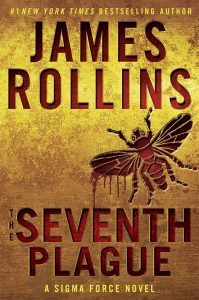James Rollins is known to millions of readers for his international thrillers in which he presents scientific breakthroughs, unveils unseen worlds, and reveals historical secrets.
The Seventh Plague begins with a British archaeologist stumbling out of the Egyptian desert after having been missing for two years. He dies before he can explain what happened to his team, but his body had begun mummifying while he was still alive.
Commander Gray Pierce and his Sigma Force must uncover the truth behind these events. The archaeologist was carrying a plague organism which traced back to Moses’ ten plagues from the Bible. As the disease spreads, it threatens to trigger the other nine Biblical plagues, and Sigma Force must find a way to stop it. The search spans from Africa to the Arctic Circle.
The Seventh Plague describes self-mummification while someone is still alive. Is this possible?
Yes, it is. It’s an extensive process practiced by some Eastern sects. In the book, I sped up the process, but it actually takes years. There are people who engage in this practice so when they die, their flesh has been preserved. It involves fasting, and ingesting certain compounds that kill bacteria. They then entomb themselves along with little bells. When the bells stop ringing, it signals the practitioner has died. The tomb is opened and the body is found in a preserved state. The deceased is blessed and revered.
are people who engage in this practice so when they die, their flesh has been preserved. It involves fasting, and ingesting certain compounds that kill bacteria. They then entomb themselves along with little bells. When the bells stop ringing, it signals the practitioner has died. The tomb is opened and the body is found in a preserved state. The deceased is blessed and revered.
Similar practices have been noted in China, Japan, India, and in some areas of Egypt. It’s such a shocking ritual that when I was writing The Seventh Plague, I wanted to find a way of folding it into the story.
There’s always been a question about whether the ten plagues described in the Bible actually happened. The Seventh Plague partly deals with that question. Can you tell our readers about it?
We’re currently dealing with the question of whether climate change is happening. Many of the so-called plagues as described in the Bible could be attributed to climactic and ecologic changes which occurred very rapidly. If similar circumstances arose today, what plagues of biblical proportions might occur?
While The Seventh Plague isn’t a treatise on climate change, this issue is a concern raised in the novel. Tell us more about that.
It’s difficult to deny that there are climactic changes. We now have record-breaking temperatures, and melting of the ice caps. I read an article a few days ago reporting that the Arctic is thirty-six degrees warmer than normal. The permafrost is melting in that region, which makes the resources in the Arctic more easily accessible. Various countries are trying to tap into those resources and this quest is becoming the source of conflict between Canada, Russia, and Denmark. It’s becoming a political hotbed, and I wanted to cast some light on that subject. Also, it’s quite shocking to me that cruise ships are now applying for trips through the Northwest Passage, a voyage that not too many years ago was too perilous to even contemplate.
The Seventh Plague connects to the crisis with the Zika virus. Tell us how this relates to the story.
I’m always looking for small tidbits that can fit into a novel.
I was reading about Zika virus and it pathogenesis. I was curious about where it originated—apparently, from monkeys in Uganda—and it’s managed to spread around the world. With the world being as interconnected as it is by jet travel, plagues can spread globally very quickly. This organism’s major impact is its causing cognitive birth defects. It got me thinking about the possibility of a Zika virus mutation specifically targeting male offspring. By limiting it to male offspring, it would provide a link to the biblical plague of the death of the first-born sons.
As is often the case in a James Rollins novel, you weave historical figures into the storyline. Tell us a bit about Mark Twain and Nicola Tesla.
I’ve always wanted to write a story with Mark Twain as a character in it. I grew up in Missouri and have always been a big Mark Twain fan. Once upon a time, I borrowed his surname as a pen name. So, in this story, I used the real-life relationship that existed between Mark Twain and Nicola Tesla. In my opinion, Tesla was one of the most important American inventors, and I am fascinated by the fact that Twain and Tesla were friends. Mark Twain not only had a friendship with Tesla, but also had a relationship with Stanley—the man always associated with Livingston—which I also incorporated into the novel. I wanted to explore the relationship between a great writer and a great inventor.
The last few pages of The Seventh Plague are startling. I understand this novel is quite personal for you. Will you tell us why?
It’s a poorly-kept secret that my parents had been afflicted with Alzheimer’s Disease, which is reflected in the novel. The first indication of problems with Commander Pierce’s parents occurred early on in this series of twelve books. The pattern in the books follows the course of my own parents’ decline.
I wanted to shine a light on the meanings of being a caregiver to a loved one who’s slowly deteriorating over the course of time. No writer works in a vacuum, and I was dealing with the loss of my Dad who died about halfway through my writing this novel. That’s where my mind was, and some of that’s reflected in The Seventh Plague.
What has piqued your scientific curiosity lately, and will you work it into your next novel?
I have the science worked out for the next novel, but unfortunately I’m going to refrain from talking in depth about it lest it ruin some surprises. Suffice it to say, the next novel will be delving into an attempt to prolong life, if not resurrect it….because truth be told, something has already succeeded in performing this feat and it’s about to cause a world of trouble for Sigma Force.
Congratulations on penning The Seventh Plague, an intriguing novel bursting with originality, mesmerizing scientific details, and startling historical mysteries, all told as a fast-paced adventure.




